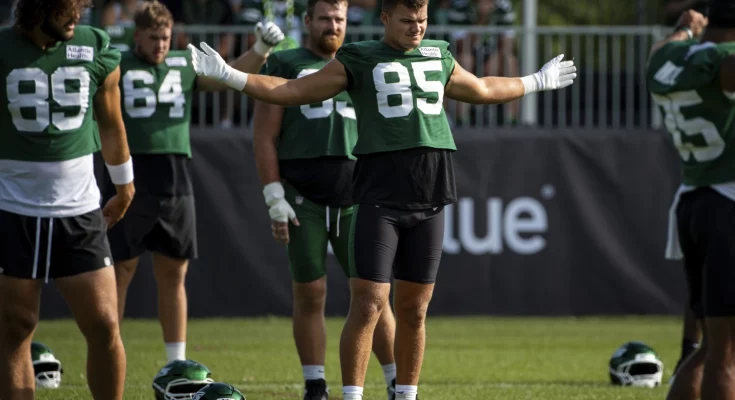Training camp is supposed to be a time of optimism, growth, and opportunity in the NFL. For the New York Jets, it was beginning to feel just that. The team had shown flashes of cohesion, energy, and promise early in August, thanks in part to a solid rookie class, improved chemistry on both sides of the ball, and the presence of veterans who were finally getting healthy and returning to form. Among the standouts was rookie tight end Mason Taylor, whose performances in camp had drawn praise from coaches and teammates alike. Quarterback Tyrod Taylor, a seasoned NFL veteran expected to serve as an invaluable backup and mentor to starter Aaron Rodgers, had also been instrumental in providing leadership and stability in the quarterback room. But on a recent morning in Florham Park, the clouds darkened—both literally and figuratively—as the Jets were dealt a potentially destabilizing blow: both Mason Taylor and Tyrod Taylor missed practice due to injury.
For a franchise that has been clawing its way back to relevance, even a small disruption can feel seismic. Mason Taylor’s absence was particularly jarring. The rookie out of LSU had been turning heads in each practice, routinely making catches in traffic, holding his own in blocking drills, and demonstrating an uncommon maturity for a first-year player. Tight ends coach Ron Middleton had recently praised Taylor’s work ethic, stating, “He’s just different. You give him something once, and he’s got it. Not a lot of rookies are like that.” That kind of praise had become the norm, not the exception. So when Taylor was a no-show on the field, reporters immediately began whispering about what this could mean for the Jets’ tight end depth, particularly in an offense that is expected to lean heavily on short-to-intermediate passing concepts.
Word from team sources is that Mason Taylor is dealing with a “lower body issue,” and the Jets are being understandably cautious. There was no indication that the injury is long-term, but in the NFL, “precautionary” absences have a way of turning into multi-week sideline stints. Jets fans have seen that story unfold too many times to feel comfortable. The team has not yet placed Taylor on the injury report officially, but with preseason action on the horizon, any missed time for a rookie is cause for concern—not just because of the reps lost, but because of how quickly the league moves. Missing even a week of camp can mean the difference between starting the season as TE2 versus sliding down the depth chart behind a more experienced player.
Meanwhile, Tyrod Taylor’s absence presents its own set of challenges. The veteran quarterback has played in just about every kind of offensive system during his 13-year NFL career, making him a uniquely valuable resource for Aaron Rodgers, who is still settling into the Jets’ complex offensive scheme. Rodgers has lauded Taylor’s presence as being “calming and consistent,” especially during situational walkthroughs and two-minute drills. With Taylor now unavailable, the team must lean more heavily on less experienced quarterbacks, which could have ripple effects throughout the offensive unit.
According to early reports, Tyrod Taylor’s injury is “back-related,” which is always a sensitive topic for quarterbacks, especially those north of 30. Back injuries can linger, flare up unpredictably, and impact everything from throwing mechanics to mobility in the pocket. Even though Taylor was not expected to see much action beyond spot duty and emergency scenarios, his importance cannot be overstated. He was essentially the insurance policy for a team placing all its chips on a 41-year-old quarterback coming off a torn Achilles. Losing Tyrod, even temporarily, makes that insurance policy look a lot riskier.
The injuries come at a particularly inconvenient time for the Jets, who are entering the second phase of training camp—the transition from individual improvement to full-team execution. This is the stretch where chemistry is built, mistakes are ironed out, and offensive rhythm begins to emerge. Without Mason Taylor running routes or Tyrod Taylor taking backup reps, the offense lacks two of its most integral cogs. It’s not just about missing bodies; it’s about missing voices, rhythm-setters, and in Taylor’s case, a potential breakout star who had begun earning first-team reps.
Head coach Robert Saleh addressed the media following the practice, downplaying the severity of both injuries but offering little in the way of specifics. “We’re being smart with both guys. Nothing serious, but we’re not going to rush them back,” Saleh said. His tone was calm, but his eyes betrayed concern. Saleh knows better than most that in the NFL, momentum is fragile. The Jets have spent months building it—stacking workouts, fine-tuning the locker room dynamic, and fostering belief in a roster that many consider playoff-caliber. Disruptions, even small ones, can be destabilizing if not managed properly.
This is especially true for Mason Taylor, whose role in Nathaniel Hackett’s offense was beginning to expand. The rookie was being used in motion, split out wide, and aligned in H-back formations during team drills. His versatility was unlocking schematic possibilities for an offense that wants to avoid becoming predictable. Without him, those play designs either go back on the shelf or get tested with a player who may not have the same skill set.
Meanwhile, the ripple effect of Tyrod Taylor’s absence could be felt on special teams and practice efficiency. Taylor is known for his command of the scout team offense, and his ability to mimic opposing quarterbacks gives the defense high-quality looks during preparation. Without him, that role falls to less experienced players who may not be able to replicate complex reads and movement. It may sound trivial, but over time, those reps add up—and can be the difference between a blown coverage and a game-winning stop in Week 1.
Jets fans, eternally optimistic yet brutally conditioned by disappointment, took to social media with a mix of concern and measured panic. “Here we go again,” wrote one fan on X (formerly Twitter). “This team can’t have nice things.” Another quipped, “Can someone bubble-wrap the entire roster until Week 1?” While the humor is there, the sentiment is real. The Jets are in a crucial phase of their evolution as a franchise. Expectations are higher than they’ve been in over a decade. The margin for error is thin. And even minor setbacks are amplified when you’re trying to climb from irrelevance to contender status in a loaded AFC.
There is, of course, a silver lining. The absences provide opportunities for others. Backup tight end Jeremy Ruckert has already stepped into more first-team reps and is showing flashes of the form that made him a standout at Ohio State. Undrafted quarterback Jordan Travis, signed earlier this summer, now has a larger platform to showcase his skills in live drills. These are the moments that define training camp for depth players—stepping in during the unexpected and forcing coaches to reconsider assumptions about the depth chart.
Still, make no mistake: the Jets need Mason Taylor and Tyrod Taylor healthy. One represents the future; the other safeguards the present. And for a team with aspirations that include a deep playoff run and possibly even a Super Bowl push, every piece matters. The organization has done an impressive job building a roster with talent, depth, and accountability. But depth only works when players are available. As camp continues, the focus will be on recovery timelines, re-integrations into the practice routine, and monitoring how their absence impacts the overall flow of the team’s preparation.
The Jets are not in crisis—not yet. But these are the types of developments that can either harden a team’s resolve or reveal its fragility. Robert Saleh, Aaron Rodgers, and the rest of the locker room will be hoping it’s the former. For now, all they can do is stay the course, hope for positive medical evaluations, and ensure that the rest of the team stays locked in. Because in the NFL, even a momentary stumble in August can ripple all the way into January.



